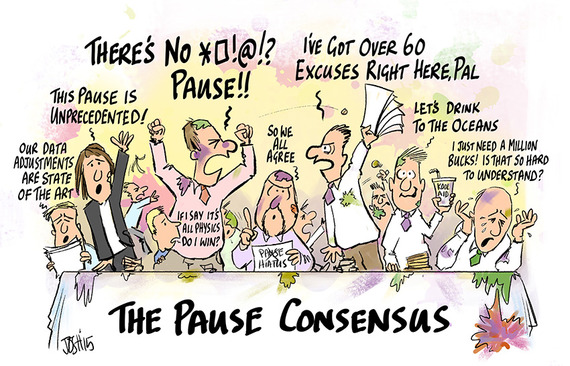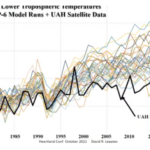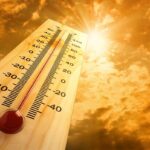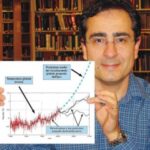
In klimatologenland woedt er al jaren een discussie of er nu wel of niet een opwarmingspauze ofwel hiatus is.
Onder de titel, ‘New paper shows there was a global warming hiatus this century’, schreef Thomas Richard voor ‘The Examiner’:
Climate researchers have published a new paper this week in the journal Nature Climate Change that acknowledges there has been a global warming slowdown from 2000-2014. Their research shows a hiatus did indeed occur and continued into the 21st century, contradicting another study last June that said the hiatus was just an artifact that “vanishes when biases in temperature data are corrected.” This is not the first time activists have tried to hide the hiatus by using dodgy methods.
This new paper shows a global warming slowdown or hiatus, the authors write, which has been “characterized by a reduced rate of global surface warming, has been overstated, lacks sound scientific basis, or is unsupported by observations.” They add, “The evidence presented [in this paper] contradicts these claims.” Ouch.
In this new paper, the authors show there is a “mismatch between what the climate models are producing and what the observations are showing,” says lead author John Fyfe, a climate modeller at the Canadian Center for Climate Modelling and Analysis in Victoria, British Columbia. “We can’t ignore it.” Fyfe prefers the term slowdown over hiatus and adds the usual caveats lest he be taken away from the global warming cash cow: it in no way undermines “global warming theory.” …
Karl Thomas, the lead author of the so-called “pause busting” study says it’s “important to investigate how short-term effects might impact decadal trends, but says that these short term trends do not necessarily elucidate the long-term effects of rising greenhouse-gas concentrations in the atmosphere.”
Fyfe and his colleagues argue that “Karl’s approach was biased” because of a flat temperature pause between the 1950s and 1970s. Fyfe says that his research took into account events that affect decadal temperature trends such as volcanic eruptions, which dampen solar radiation. As an example, climate models underestimate volcanic eruptions and how they impact how much solar radiation hits the planet, specifically at the start of the 21st century.
Susan Solomon, a climatologist at Massachusetts Institute of Technology (MIT) in Cambridge, says that Fyfe’s research helps put “twenty-first-century trends into perspective, and clearly indicates that the rate of warming slowed down at a time when greenhouse-gas emissions were rising dramatically.” Solomon says, “It’s important to explain that. As scientists, we are curious about every bump and wiggle in that curve.” ….
Deze constructieve reactie van Susan Solomon is des te opmerkelijker omdat zij in kringen van het VN-klimaatpanel (IPCC) hogelijk wordt gewaardeerd.
Fyfe’s paper concludes by saying their “results support previous findings of a reduced rate of surface warming over the 2001-2014 period — a period” when emissions like carbon dioxide increased at a steady rate of about two parts per million each year. They point out that the climate models did not predict the warming hiatus that occurred during the first 14 years of the 21st century, even while so-called greenhouse gases have risen. This “mismatch” is a problem that deserves more scientific scrutiny, they add.
Zie verder hier.
Het feit dat deze studie in een ‘peer-reviewed’ tijdschrift is verschenen, toont aan dat het ‘cordon sanitaire’ tegen artikelen die kritisch staan ten opzichte van AGW (AGW = ‘Anthropogenic Global Warming’) barsten begint te vertonen. Het zelfreinigend vermogen van de klimatologie manifesteert zich steeds sterker, waardoor het een ‘normale’ wetenschap wordt waar vrije discussie mogelijk is. Het gaat dus de goede kant op. E.e.a. bewijst m.i. ook dat er geen sprake is van een pro–AGW ‘complot’ onder klimatologen, zoals sommige klimaatsceptici wel beweren.
Dit kritische artikel staat overigens niet op zichzelf. In 2015 verschenen zo’n 250 artikelen die kritiek bevatten op AGW, en dit jaar zijn er al bijna 50 verschenen.
Voor mijn eerdere bijdragen over klimaat en aanverwante zaken zie hier, hier, hier, hier en hier.






Wel of geen hiatus in de afgelopen jaren, dat is een eindeloze welles-nietes discussie en daarom niet zo interessant. Het ligt er maar net aan over hoeveel jaar je kijkt. Kijk je over periodes van 5 of 10 jaar dan is er in veel gevallen een stagnatie in de opwarming te zien. Dat soort periodes zijn misschien leuk voor politici en klimaat-‘watchers’, maar voor de klimaatwetenschap te kort. Dat komt omdat een aantal belangrijke verschijnselen, zoals El Niño te onregelmatig zijn en een te lage frequentie hebben.
Kijk je over langere periode dan is er alleen een vermindering van de opwarming te zien.
Daarnaast is de discussie niet meer actueel, alles wat op klimaatverandering wijst zit het afgelopen jaar weer in de lift. Zo was 2015 het warmste jaar ooit
http://www.weerwoord.be/uploads/1622016225911.png
(kijk op http://www.weerwoord.be verdiepingsforum voor toelichting)
Het zeeijs rond de Noordpool gaat af op het laagste maximum ooit:
http://arctic.atmos.uiuc.edu/cryosphere/arctic.sea.ice.interactive.html
De berekende zeespiegelstijging per jaar sinds 1993 (begin satelliet-metingen) zit op de hoogste waarde ooi (misschien afgezien van het begin maar toen was de meetserie te kort)
http://climate.nasa.gov/vital-signs/sea-level/
5 of 10 jaar is te kort, maar het laatste jaar …
Precies…. ;-)
Kijken we nog verder terug dan wordt het beeld wel duidelijker:
http://wattsupwiththat.com/2016/02/07/long-term-climate-change-what-is-a-reasonable-sample-size/
Hiatus is wel interessant. Hiatus versterkt nog eens meer dat de CAGW-theorie nonsens is.
Goh, en gisteren in het NOS 8 uur journaal nog het bericht dat de opwarming sterker is dan gedacht en dat we over 25 jaar al de 2 gradengrens hebben bereikt!
Zie hier bij 14.20 minuten: http://nos.nl/uitzending/13114-uitzending.html
Wie vertelt er nu de waarheid?
Léon,
Dat NOS-bericht is gebaseerd op deze studie:
http://www.pbl.nl/nieuws/nieuwsberichten/2016/nieuwe-schatting-van-het-mondiale-koolstofbudget
Dat hebben ze er niet bij verteld. Dat was natuurlijk slordig.
Dat is een modelstudie. Natuurlijk heb je modellen nodig in de wetenschap. Zonder modellen krijg je überhaupt geen greep op een complex systeem – in dit geval het klimaat.
Maar anderzijds geven die modellen je een vals gevoel van nauwkeurigheid.
Ik vind dat Ross McKitrick dat in deze serie video’s heel duidelijk heeft aangegeven.
http://climategate.nl/2016/02/24/minicolleges-van-ross-mckitrick-over-klimaatmodellering-enz/
Alle klimaatmodellen laboreren volgens mij aan een overschatting van het effect van CO2 op de temperatuur. Als je hiervoor corrigeert, ziet de toekomst er minder warm en in het geheel niet verontrustend uit.
En ja, het is mij bekend dat 2015 extra warm was. Maar zoals je weet, zijn velen in de mainstream en nagenoeg alle klimaatsceptici het erover eens dat dit is veroorzaakt door El Nino (die heeft niets te maken met CO2 van welke oorsprong dan ook: natuurlijke of menselijke). Men verwacht dat El Nino in de loop van dit jaar zal worden opgevolgd door La Nina met de daarbij behorende temperatuurdaling.
Het is trouwens opvallend dat er de laatste tijd veel artikelen (honderden!) verschijnen in de mainstream ‘peer-reviewed’ literatuur, die een dominante invloed toeschrijven aan natuurlijke factoren in plaats van (menselijk) CO2.
Vanuit mijn perspectief is dat een verheugend signaal van het zelfreinigend vermogen van de klimatologie op dit moment.
“Modelstudie”: Nieuwe schatting van oude eerdere schattingen van vermoedens op basis van een politieke afspraken over een wetenschappelijk wankele CAGW-theorie.
Hiatus?
Het begrip “hiatus”, ofwel pauze in de opwarming van de aardatmosfeer, is gebaseerd op een onjuist idee, namelijk dat de opwarming van de atmosfeer in de toekomst moet doorgaan. Dit idee is weer gebaseerd op de onjuiste hypothese dat de atmosfeer opwarmt door menselijke uitstoot van CO2 en dat die zal doorgaan bij verdere uitstoot. Deze hypothese is nooit bewezen en is in feite weerlegd. Ondanks de voortdurende uitstoot van CO2 vond er alleen opwarming plaats tussen 1979 en 1998, daarvóór niet (vanaf 1940) en daarnà ook niet. De atmosfeer “moet” dus helemaal niet verder opwarmen. Als die inderdaad niet opwarmt is er dus geen sprake van een pauze of hiatus. De gemiddelde temperatuur van de atmosfeer (die overigens niet nauwkeurig te bepalen is, zeker niet op enkele tienden van een graad) gaat grillig op en neer en kan in de toekomst net zo goed omlaag gaan als omhoog. Dat weten wij niet. Mijn persoonlijke indruk is dat de kans op een temperatuurdaling groter is dan de kans op een temperatuurstijging. Dit baseer ik op studies van astronomen.
De hele discussie of er nu wel of niet een “hiatus” is opgetreden is dus zinloos. Het begrip hiatus is feitelijk onzin.
Tja, zo kan je het ook bekijken. En weet je Dick, wat nu het mooie is? Je gaat vanzelf gelijk krijgen zodra het gaat afkoelen. Maar omdat van afkoeling geen spoortje te bekennen is nemen toch maar even het zekere voor het onzekere. Kan vast niet lang meer duren. Die afkoeling zal wel snel komen. Toch?
Herman dat klinkt als het voorzorgsprincipe. Laten we 100 miljard uitgeven voor iets waarvan we niet weten of het gebeurt en ook niet of 100 miljard helpt. Maar dan hebben we in ieder geval iets gedaan.
Dat kopt beste Bleeker dat is het voorzorg-principe. Niet geheel op een blind gevoel maar op sterke aanwijzingen. De kans dat er helemaal mis wordt gegokt is nu ook weer niet zo groot. En alleen voor Nederland moet je eerder aan 1000 miljard denken dan honderd miljard. Maar niet getreurd. De keus is niet voor levenslang. Indien het een aantal jaartjes duidelijk afkoelt gaan we er toch hel anders over denken. Of dan die windmolens weg gaan is nog maar de vraag. Veel mensen willen hoe dan ook windmolens. Met of zonder klimaatverandering.
Als ik op een zomerse dag mijn auto in de zon parkeer, dan wordt het erbinnen wel 70 graden. Maar 1 meter erbuiten op de straat is de temperatuur maar 25 graden.
In de auto treedt het broeikaseffect op. Dat houdt in: zonnestralen verwarmen het interieur, maar die warmte kan er niet uit wegens gebrek aan convectie. Een evenwicht treedt pas op als de auto 70 graden is, 45 graden boven de omgevingstemperatuur straalt het voertuig evenveel uit als er in komt.
Conclusie: de aarde is geen broeikas, maar een koelbox. Anders was het namelijk buiten de auto ook 70 graden.
Versimpeling leidt zelden tot een vergelijking naar tevredenheid. Versimpeling, het is vooral een debat trucje.
Where is the warming CO2 when you need it???
Van 23 op 24 januari 1916 daalden in Browning in Montana de temperatuur van +7° Celsius naar -49° Celsius.Dit is het grootste gemeten temperatuursverschil op één dag.
—–
De gemiddelde temperatuur op Mars bedraagt -60° Celsius. In de winter kan de temperatuur aan de polen zakken naar -125° Celsius. In de zomer kan de temperatuur aan de evenaar oplopen tot 20° Celsius maar gedurende de nacht kan deze dan wel zakken tot ongeveer -73° Celsius.
Ter info: de atmosfeer op Mars bestaat voor 95% uit CO2.
——–
De grootste en heetste woestijn ter wereld is de Sahara in Afrika. Het zand is er overdag zo heet dat je huid bij aanraking kan verbranden. ’s Nachts kan de temperatuur makkelijk tot onder nul dalen.
De stand van zon en de afwezigheid van wolken (!!!)zijn bepalend voor de grote verschillen tussen de dag- en nachttemperatuur in de woestijn.
In de buurt van de evenaar, waar de Sahara ligt, staat de zon recht boven de aarde waardoor de warmte daar heel geconcentreerd is. Ook is er een hele droge lucht en bijna geen vocht dat kan verdampen om wolk te worden. Als er geen wolken zijn kan de zon overdag ongehinderd op de aarde branden en
is er ‘s nachts geen wolkendeken om de warmte, die de aarde afgeeft, tegen te houden.
——
Wel als CO2 dan zo’n immens broeikas gas is, hoe kan het dan ditzelfde ‘wondergas’ een temperatuurdaling van 50 tot 90 graden Celsius in een paar uur tijd NIET weet te stoppen?
Simpel. Omdat CO2 een ‘broeikasgas’ van niks is. Ten eerste is het doorzichtig, (lees: het tegenovergestelde van een spiegel) dus laat nagenoeg alle straling door, met de snelheid van het licht nog wel, ten tweede heeft het relatief gezien nauwelijks massa OM iets vast te houden, en ten derde is alleen al lachgas (N2O) een 310 keer ‘sterker’ ‘broeikasgas’ dan CO2.
‘Lachgas is een broeikasgas. Deze broeikaswerking is 310 maal groter dan die van koolstofdioxide.’
https://nl.wikipedia.org/wiki/Distikstofmonoxide
(oftewel: 16 ppm man-made CO2 die nog niet eens (100/310) % weet vast te houden is wat mij betreft een sukkelgas. Dat is vergelijkbaar met een vent van 100 KG die net in staat is om 300 gram te liften. Dat noem je ook geen ‘sterke man’ maar eerder iemand met een zéér ernstige spierziekte.
En nog een swat. Hoe LANG houdt CO2 eigenlijk warmte vast. Hoor ik ook nooit wat over. Straling komt en gaat met de snelheid van het licht.
Of is er ooit eens in een lab een test gedaan met opwarmen van CO2 en dat bleek dat het 0,1% van alle straling vasthield maar daarna is nagelaten om te zeggen HOE LANG dit energie vasthield?
Wie wel eens heeft gebiljard weet dat na een x aantal seconden alle ballen toch echt weer in ruststand komen… ondanks alle ‘versterkingsfactoren’ etc.
Een gas dat warmer wordt stijgt op.
Where is the warming CO2 when you need it???
Van 23 op 24 januari 1916 daalden in Browning in Montana de temperatuur van +7° Celsius naar -49° Celsius.Dit is het grootste gemeten temperatuursverschil op één dag.
—–
De gemiddelde temperatuur op Mars bedraagt -60° Celsius. In de winter kan de temperatuur aan de polen zakken naar -125° Celsius. In de zomer kan de temperatuur aan de evenaar oplopen tot 20° Celsius maar gedurende de nacht kan deze dan wel zakken tot ongeveer -73° Celsius.
Ter info: de atmosfeer op Mars bestaat voor 95% uit CO2.
——–
De grootste en heetste woestijn ter wereld is de Sahara in Afrika. Het zand is er overdag zo heet dat je huid bij aanraking kan verbranden. ’s Nachts kan de temperatuur makkelijk tot onder nul dalen.
De stand van zon en de afwezigheid van wolken (!!!)zijn bepalend voor de grote verschillen tussen de dag- en nachttemperatuur in de woestijn.
In de buurt van de evenaar, waar de Sahara ligt, staat de zon recht boven de aarde waardoor de warmte daar heel geconcentreerd is. Ook is er een hele droge lucht en bijna geen vocht dat kan verdampen om wolk te worden. Als er geen wolken zijn kan de zon overdag ongehinderd op de aarde branden en
is er ‘s nachts geen wolkendeken om de warmte, die de aarde afgeeft, tegen te houden.
——
Wel als CO2 dan zo’n immens broeikas gas is, hoe kan het dan ditzelfde ‘wondergas’ een temperatuurdaling van 50 tot 90 graden Celsius in een paar uur tijd NIET weet te stoppen?
Simpel. Omdat CO2 een ‘broeikasgas’ van niks is. Ten eerste is het doorzichtig, (lees: het tegenovergestelde van een spiegel) dus laat nagenoeg alle straling door, met de snelheid van het licht nog wel, ten tweede heeft het relatief gezien nauwelijks massa OM iets vast te houden, en ten derde is alleen al lachgas (N2O) een 310 keer ‘sterker’ ‘broeikasgas’ dan CO2.
‘Lachgas is een broeikasgas. Deze broeikaswerking is 310 maal groter dan die van koolstofdioxide.’
https://nl.wikipedia.org/wiki/Distikstofmonoxide
(oftewel: 16 ppm man-made CO2 die nog niet eens (100/310) % weet vast te houden is wat mij betreft een sukkelgas. Dat is vergelijkbaar met een vent van 100 KG die net in staat is om 300 gram te liften. Dat noem je ook geen ‘sterke man’ maar eerder iemand met een zéér ernstige spierziekte.
En nog een swat. Hoe LANG houdt CO2 eigenlijk warmte vast. Hoor ik ook nooit wat over. Straling komt en gaat met de snelheid van het licht.
Of is er ooit eens in een lab een test gedaan met opwarmen van CO2 en dat bleek dat het 0,1% van alle straling vasthield maar daarna is nagelaten om te zeggen HOE LANG dit energie vasthield?
Wie wel eens heeft gebiljard weet dat na een x aantal seconden alle ballen toch echt weer in ruststand komen… ondanks alle ‘versterkingsfactoren’ etc.
(technische problemen bij reaguren hier…)
Tja, zo kan je het ook bekijken. En weet je Wiersma wat nu het mooie is? Je gaat vanzelf gelijk krijgen. Als CO2 een broeikasgas van niks is dan zal het binnenkort vanzelf wel eens een keertje gaan afkoelen. Maar omdat er nog steeds geen spoortje van die afkoeling te vinden is nemen wij nog maar even het zekere voor het onzekere en nemen maatregelen. De afkoeling komt vast al snel… Toch Wiersma?
“Maar omdat er nog steeds geen spoortje van die afkoeling te vinden is nemen wij nog maar even het zekere voor het onzekere en nemen maatregelen.”
Tsja, dat is natuurlijk een heel andere discussies, wat nu eigenlijk de meest zinvolle, meest logische, meest kosten-efficiënte maatregelen zijn om te nemen als voorbereiding op een veranderend klimaat.
Ik ben bang dat de maatregelen die nu door regeringen en angsthazen voorgesteld/geëist/gesubsidieerd worden niet erg goed scoren.
Het zien we de menselijke geest aan het werk: tien jaar stijgende huizenprijzen en niemand gelooft dat er ooit nog daling kan plaatsvinden.
Of moet de conclusie zijn dat uiteindelijk alles onder water staat?
Kerncentrales en de dijken ophogen zou dan de logische reactie zijn. Maar nee zonnepaneel en windmolens worden gekozen die geen effect gaan sorteren.
Het voordeel van geloof is dat je alles kan debiteren zonder de noodzaak tot onderbouwing.
Als klimaat atheïst poneer ik hier de stelling: “de Sahara is ontstaan door een te lage CO2 concentratie van de atmosfeer”.
Zo.
Montana is tamelijk berucht om dit verschijnsel in de winter dat zelfs in romans worden beschreven. Ik heb me er niet in verdiept, maar het zullen ongetwijfeld locale omstandigheden zijn.
Even een paar dingetjes vooraf:
Je hoort mij niet zeggen dat de aarde niet wat zou kunnen opwarmen, maar dat komt dan absoluut niet van/door CO2, misschien een biljoenste graad misschien, maar totaal verwaarloosbaar dus,
Je hoort mij ook niet ontkennen dat er sinds een eeuw iets meer CO2 in lucht is bijgekomen.
Het enige wat energie kan genereren, absorberen of vasthouden is MASSA.
Dat hele kleine beetje (man-made) CO2 heeft relatief gezien een massa van niks.
Daarom zijn kogels van lood. Daarom zijn bunkers van dik gewapend beton en niet van papier maché. Daarom zijn de meeste motoren watergekoeld en niet luchtgekoeld. Daarom kun je je te pletter rijden tegen een stenen muur maar lukt dat niet bij een muur van pingpong ballen. Daarom bestaan speksteen kachels. Een muis op je kop krijgen overleef je wel maar een nijlpaard op je kop krijgen wordt al een stuk lastiger qua overleving.
Het enige wat geluid (soverlast) kan keren is massa. Het enige wat straling eveneens kan keren is massa. Bij radioactieve straling is dat bijvoorbeeld lood.
U weet wel, van lood-ZWAAR. Waarbij zwaar dan weer een soort equivalent is van massa.
Uitzonderingen zijn er ook: bij licht is dat bijvoorbeeld een spiegel of iets dat als zodanig functioneert zoals het zeer lichte aluminium huishoud folie.
En water/waterdamp/stoom/wolken kan meerdere petten ophebben. Het kan zowel een verwarmend als wel een koelend effect hebben. Het is maar net waar de straling vandaan komt. Het kan werken als een spiegel maar ook alles nagenoeg doorlaten.
Maar omdat het tevens 1000 maal zwaarder is dan lucht speelt convectie en verdamping ook nog eens een (dubbel)rol. Daarom zweet je ook als het warm is.
Massa is wat er echt toe doet.
Sinds de vorige eeuw is de bevolking toegenomen en derhalve de verstedelijking en derhalve is er heel veel MASSA bovengronds gehaald om er huizen en gebouwen van te maken. Deze extra massa absorbeert hoe dan ook meer energie en kun je enigszins vergelijken met een omgekeerde koelvin.
De aarde heeft er met de verstedelijking dus nogal ‘warmtevinnen’ bijgekregen die overdag opgewarmt ` s nachts hun energie weer langzaam afgeven.
En derhalve de lucht iets opwarmen. Daarom kan het `s winters in een stad ook maar zo een paar graden warmer zijn dan op het platteland.
Het is wat Rypke zegt: niet CO2 is het probleem maar U bent dat.
Gewoon omdat u bestaat en in een aard-convector woont en werkt.
AKA : huis, woning, kantoor of fabriek.
Daarbij bent u ook nog een opvreter, een opwarmer en een vervuiler.
Aldus Agenda 2030, voorheen Agenda 21.
Een mooi verhaal Wiersma, Maar eerlijk gezegd denk ik dat “de wereld” er niet een aanleiding in ziet de ingeslagen weg te veranderen. Alleen afkoeling zal de wereld schokken. Zolang dat niet gebeurd zal de “de wereld” doorgaan met het verder ontwikkelen van mitigatie beleid.
@Wiersma, leuk om je gedachten naar al die dingen te laten dwalen, ik heb dat ook dikwijls.
Overigens, lees jij de vervolgreacties op jouw reacties wel eens? Bijvoorbeeld in de post van 8 februari, “duurzaamheid is van ..” .
Eerst heb je veel vragen, dan krijg je antwoord(en) en vervolgens stopt het… Jammer toch?